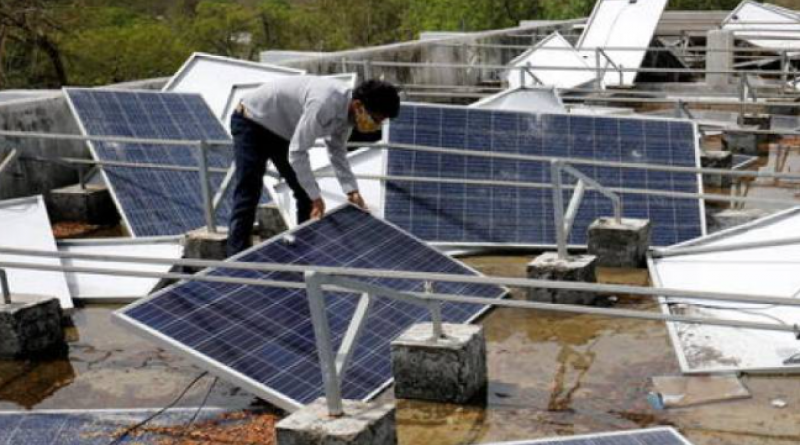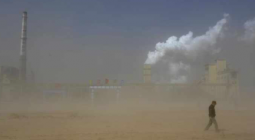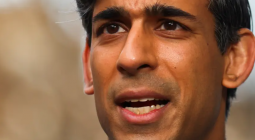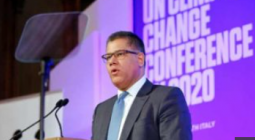Where is the money? Climate finance shortfall threatens global warming goals

Time is running out for rich governments to deliver on unmet funding promises before COP26 climate talks, with many developing nations saying their emissions cuts depend on it
* Rich nations under pressure to deliver unmet $100-billion pledge
* More ambitious climate plans hinge on international funding
* Eyes on U.S. to boost finance at U.N. gathering next week
(Adds 2019 climate finance data and U.N. climate chief comment)
By Beh Lih Yi and Megan Rowling
KUALA LUMPUR/BARCELONA, Sept 17 (Thomson Reuters Foundation) - For a storm-prone developing country like the Philippines, receiving international funding to protect its people from wild weather and adopt clean energy is not only an issue of global justice - the money is essential to deliver on its climate plan.
Without promised support, many vulnerable poorer nations - battered by the economic impacts of COVID-19 and surging climate disasters - say they simply cannot take more aggressive action to cut planet-heating emissions or adapt to a warmer world.
The Philippines, for example, has pledged to reduce its emissions 75% below business-as-usual levels by 2030.
But only about 3 percentage points of that commitment can be delivered with its own resources, its national climate plan says. The rest will require international finance to make sectors like farming, industry, transport and energy greener.
"Environmental groups say our (target) is unambitious because it's highly conditional. What they don't see, however, is what we submitted is what is doable for the Philippines," said Paola Alvarez, a spokesperson at the Department of Finance.
"Our economy is not doing well because of the pandemic and we have back-to-back typhoons every now and then," which means national resources need to be prioritised for social programmes, she told the Thomson Reuters Foundation.
As leaders prepare to attend the United Nations General Assembly in New York next week, wealthy nations are coming under ever-greater pressure to deliver on an unmet pledge, made in 2009, to channel $100 billion a year to poor countries to tackle climate change.
With budgets worldwide squeezed by the COVID-19 crisis and U.N. climate talks postponed for a year, the original 2020 deadline to meet the goal was likely missed, analysts have said.
But as November's COP26 climate summit approaches fast, time is running out to convince developing countries - both big and small emitters - that any efforts at home to raise their climate game will be met with solid financial backing, analysts say.
Alden Meyer, a senior associate in Washington for think-tank E3G, focused on accelerating a low-carbon transition, said the $100-billion promise is well below what is actually needed by emerging economies to mount an adequate response.
But delivering on it is key to spurring them on, he added.
Right now, they can say, "the developed countries aren't doing what they said they would do in terms of support, so why should we ramp up ambition (to cut emissions)?" Meyer said.
Government officials in India - the world's fourth-biggest emitter of planet-heating gases - have said, for example, that any further commitment to reduce its carbon footprint will depend on funding from rich countries.
National pledges to cut emissions so far are inadequate to keep global temperature rise to "well below" 2 degrees Celsius above preindustrial times, and ideally to 1.5C, as about 195 countries committed to under the 2015 Paris Agreement.
The U.N. climate science panel warned in a report in August that global warming is dangerously close to spiralling out of control and will bring climate disruption globally for decades to come, in wealthy countries as well as poor ones.
'BARE MINIMUM'
Some big greenhouse gas emitters, including China, Russia and India, have yet to submit more ambitious plans to the United Nations, as they committed to do by 2020 under the Paris pact.
But of the roughly 110 plans delivered by other countries ahead of an adjusted U.N. deadline in July, nearly all hinge on one key condition: money.
According to the World Resources Institute (WRI), a U.S.-based think-tank that tracks national climate pledges, "well over half" of those updated emissions goals include actions that can only happen with the support of international finance.
"This underscores why it's so critical for developed countries to deliver on their $100-billion pledge. It's the bare minimum," said Taryn Fransen, a climate policy expert at WRI.
In the latest submissions, a growing number of developing nations have stepped up with emissions goals they can implement on their own, she added, including Argentina, Chile and Colombia, which have dropped requests for support entirely.
But honouring the $100-billion annual commitment - which covers the five years until 2025, when a new yet-to-be-negotiated goal is set to kick in - is key to fostering trust within the global climate talks and facilitating a faster green transition, she stressed.
The latest figures from the Organisation for Economic Co-operation and Development, released on Friday, show that in 2019, donor governments channelled $79.6 billion to vulnerable countries, up just 2% from $78.3 billion in 2018.
An analysis by aid charity Oxfam put the real figure for 2018 - when counting only grants and not loans that have to be paid back - much lower, at $19 billion-$22.5 billion.
Meanwhile, the 46 least-developed countries between 2014 and 2018 received just $5.9 billion in total for adaptation, a level that would cover less than 3% of the funds they need this decade, found a July study from the International Institute for Environment and Development.
U.S. FALLS SHORT
Climate and development experts argue industrialised countries built their prosperity by burning fossil fuels, making them responsible for a large part of the losses happening in countries on the frontlines of worsening floods, droughts, storms and rising seas, many of them in the southern hemisphere.
A 2020 study in The Lancet Planetary Health journal estimated that, as of 2015, nations in the Global North were responsible for 92% of carbon emissions beyond safe levels for the planet, while the Global South accounted for just 8%.
Diann Black-Layne from the Caribbean nation of Antigua and Barbuda, which is battling sea level rise and more frequent hurricanes, said climate action for developing countries "has to be conditional, because we can't get the money".
Black-Layne, lead climate negotiator for the 39-member Alliance of Small Island States, questioned why wealthy governments continued to fund the fossil fuel industry while failing to meet their $100-billion-a-year pledge.
"That money is available," she said. "There is no shortage of money to get us to the 1.5C (temperature goal)."
Ahead of the COP26 summit, which starts on Oct. 31, host nation Britain has tasked Germany and Canada with coming up with a delivery plan for the elusive $100 billion a year, but observers believe that is unlikely to land until next month.
U.N. climate chief Patricia Espinosa told journalists on Friday the outstanding $20 billion was a "very, very big issue", and resolving it was key for building trust in the negotiations and enabling developing nations to implement their climate action plans.
She said she had not lost hope that "we will somehow see" the money coming together in time for COP26.
A major question is whether U.S. President Joe Biden will unveil a bigger U.S. finance commitment at the U.N. General Assembly next week, as concerns grow that the world's biggest economy is failing to cough up its fair share.
At an April summit he hosted, Biden said the United States would double its climate finance to about $5.7 billion a year by 2024 - but that level is still seen by many climate finance experts as far below what it owes to developing countries.
A recent analysis from the Overseas Development Institute said the United States should be stumping up more than $43 billion a year based on cumulative carbon emissions, gross national income and population size.
It called the United States the biggest offender among 23 donor states in terms of falling short of its responsibilities.
On Wednesday, the European Union pledged to boost the $25 billion per year it provides in climate funding to poorer countries by 4 billion euros ($4.7 billion) through 2027, and called on the United States to step up too.
Laurence Tubiana, CEO of the European Climate Foundation and a key broker of the Paris Agreement, said this week that "serious pledges" were now needed from Washington given that some European nations had already raised their commitments.
"The U.S. must step up solidarity," she said, adding she understood Washington was working hard to do so.
($1 = 0.8462 euros)
17 September 2021
Reuters




